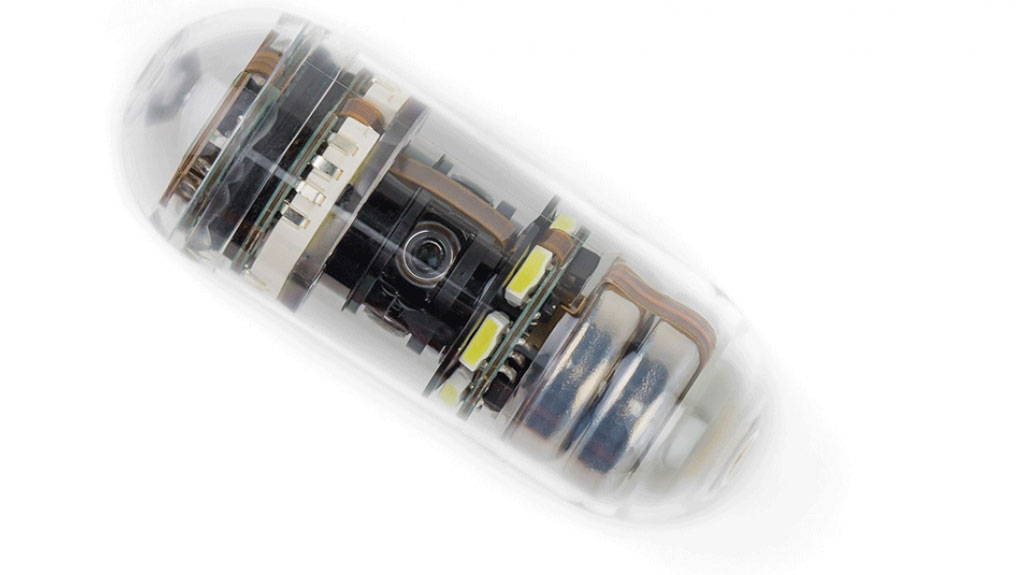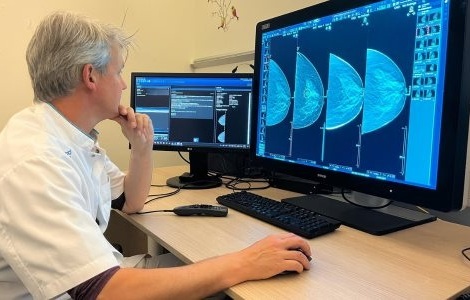360º Capsule Camera Facilitates Remote Endoscopy 
|
By MedImaging International staff writers Posted on 28 Oct 2020 |

Image: The CapsoCam Plus offers 360º imaging technology (Photo courtesy of CapsoVision)
An ingestible small bowel capsule endoscope expands the availability of remote digital pathology during the COVID-19 pandemic.
The CapsoVision (Saratoga, CA, USA) CapsoCam Plus capsule endoscope holds four laterally oriented cameras that provide a full 360° panoramic image of small bowel mucosa. Unlike camera systems that require a receiver, CapsoCam Plus holds a large-capacity onboard storage system that eliminates the need for external equipment, allowing patients to go to their home and return to their normal activities while the exam data is captured, and also eliminate risks associated with radio frequency (RF) signals.
Once the capsule is expelled from the digestive system and retrieved using a specialized tool, the patient places it immediately into a transport vial and ships it via a prepaid return envelope to the CapsoCloud Download Center, where data is uploaded to a cloud-based exam management system that allows the physician to log on to a secure, HIPAA-compliant portal to access, download, and review patient data. Physicians can also use the same web portal to facilitate data transfer to a host of designated external endoscopy reading services.
“The ability to perform any test remotely minimizes the exposure of patients and physicians, which has become especially important during the COVID-19 pandemic,” said gastroenterologist Javier Parra, MD, of Gastro Health (Miami, FL, USA). “Patients can be seen during a telemedicine appointment scheduled at their convenience and in the comfort of their own home, yet still have access to an important cutting-edge diagnostic procedure. In some instances, such as for patients with intermittent bleeding episodes, the timing of testing can be improved, which increases the yield of the test.”
“Even under normal conditions, many patients are uncomfortable with or unable to come to the office for endoscopic or capsule endoscopy procedures,” said gastroenterologist Ian Storch, DO, of St. Francis Hospital (Hyde Park, NY, USA). “The FDA's recent special enforcement policy to allow for remote tele ingestions, in response to the COVID-19 pandemic, provides gastroenterologists access to a technology that eliminates the need for patients to make multiple trips to the office, which is especially important for elderly patients and those with comorbidities.”
Related Links:
CapsoVision
The CapsoVision (Saratoga, CA, USA) CapsoCam Plus capsule endoscope holds four laterally oriented cameras that provide a full 360° panoramic image of small bowel mucosa. Unlike camera systems that require a receiver, CapsoCam Plus holds a large-capacity onboard storage system that eliminates the need for external equipment, allowing patients to go to their home and return to their normal activities while the exam data is captured, and also eliminate risks associated with radio frequency (RF) signals.
Once the capsule is expelled from the digestive system and retrieved using a specialized tool, the patient places it immediately into a transport vial and ships it via a prepaid return envelope to the CapsoCloud Download Center, where data is uploaded to a cloud-based exam management system that allows the physician to log on to a secure, HIPAA-compliant portal to access, download, and review patient data. Physicians can also use the same web portal to facilitate data transfer to a host of designated external endoscopy reading services.
“The ability to perform any test remotely minimizes the exposure of patients and physicians, which has become especially important during the COVID-19 pandemic,” said gastroenterologist Javier Parra, MD, of Gastro Health (Miami, FL, USA). “Patients can be seen during a telemedicine appointment scheduled at their convenience and in the comfort of their own home, yet still have access to an important cutting-edge diagnostic procedure. In some instances, such as for patients with intermittent bleeding episodes, the timing of testing can be improved, which increases the yield of the test.”
“Even under normal conditions, many patients are uncomfortable with or unable to come to the office for endoscopic or capsule endoscopy procedures,” said gastroenterologist Ian Storch, DO, of St. Francis Hospital (Hyde Park, NY, USA). “The FDA's recent special enforcement policy to allow for remote tele ingestions, in response to the COVID-19 pandemic, provides gastroenterologists access to a technology that eliminates the need for patients to make multiple trips to the office, which is especially important for elderly patients and those with comorbidities.”
Related Links:
CapsoVision
Latest General/Advanced Imaging News
- New Algorithm Dramatically Speeds Up Stroke Detection Scans
- 3D Scanning Approach Enables Ultra-Precise Brain Surgery
- AI Tool Improves Medical Imaging Process by 90%
- New Ultrasmall, Light-Sensitive Nanoparticles Could Serve as Contrast Agents
- AI Algorithm Accurately Predicts Pancreatic Cancer Metastasis Using Routine CT Images
- Cutting-Edge Angio-CT Solution Offers New Therapeutic Possibilities
- Extending CT Imaging Detects Hidden Blood Clots in Stroke Patients
- Groundbreaking AI Model Accurately Segments Liver Tumors from CT Scans
- New CT-Based Indicator Helps Predict Life-Threatening Postpartum Bleeding Cases
- CT Colonography Beats Stool DNA Testing for Colon Cancer Screening
- First-Of-Its-Kind Wearable Device Offers Revolutionary Alternative to CT Scans
- AI-Based CT Scan Analysis Predicts Early-Stage Kidney Damage Due to Cancer Treatments
- CT-Based Deep Learning-Driven Tool to Enhance Liver Cancer Diagnosis
- AI-Powered Imaging System Improves Lung Cancer Diagnosis
- AI Model Significantly Enhances Low-Dose CT Capabilities
- Ultra-Low Dose CT Aids Pneumonia Diagnosis in Immunocompromised Patients
Channels
Radiography
view channel
X-Ray Breakthrough Captures Three Image-Contrast Types in Single Shot
Detecting early-stage cancer or subtle changes deep inside tissues has long challenged conventional X-ray systems, which rely only on how structures absorb radiation. This limitation keeps many microstructural... Read more
AI Generates Future Knee X-Rays to Predict Osteoarthritis Progression Risk
Osteoarthritis, a degenerative joint disease affecting over 500 million people worldwide, is the leading cause of disability among older adults. Current diagnostic tools allow doctors to assess damage... Read moreMRI
view channel
Novel Imaging Approach to Improve Treatment for Spinal Cord Injuries
Vascular dysfunction in the spinal cord contributes to multiple neurological conditions, including traumatic injuries and degenerative cervical myelopathy, where reduced blood flow can lead to progressive... Read more
AI-Assisted Model Enhances MRI Heart Scans
A cardiac MRI can reveal critical information about the heart’s function and any abnormalities, but traditional scans take 30 to 90 minutes and often suffer from poor image quality due to patient movement.... Read more
AI Model Outperforms Doctors at Identifying Patients Most At-Risk of Cardiac Arrest
Hypertrophic cardiomyopathy is one of the most common inherited heart conditions and a leading cause of sudden cardiac death in young individuals and athletes. While many patients live normal lives, some... Read moreUltrasound
view channel
Wearable Ultrasound Imaging System to Enable Real-Time Disease Monitoring
Chronic conditions such as hypertension and heart failure require close monitoring, yet today’s ultrasound imaging is largely confined to hospitals and short, episodic scans. This reactive model limits... Read more
Ultrasound Technique Visualizes Deep Blood Vessels in 3D Without Contrast Agents
Producing clear 3D images of deep blood vessels has long been difficult without relying on contrast agents, CT scans, or MRI. Standard ultrasound typically provides only 2D cross-sections, limiting clinicians’... Read moreNuclear Medicine
view channel
PET Imaging of Inflammation Predicts Recovery and Guides Therapy After Heart Attack
Acute myocardial infarction can trigger lasting heart damage, yet clinicians still lack reliable tools to identify which patients will regain function and which may develop heart failure.... Read more
Radiotheranostic Approach Detects, Kills and Reprograms Aggressive Cancers
Aggressive cancers such as osteosarcoma and glioblastoma often resist standard therapies, thrive in hostile tumor environments, and recur despite surgery, radiation, or chemotherapy. These tumors also... Read more
New Imaging Solution Improves Survival for Patients with Recurring Prostate Cancer
Detecting recurrent prostate cancer remains one of the most difficult challenges in oncology, as standard imaging methods such as bone scans and CT scans often fail to accurately locate small or early-stage tumors.... Read moreImaging IT
view channel
New Google Cloud Medical Imaging Suite Makes Imaging Healthcare Data More Accessible
Medical imaging is a critical tool used to diagnose patients, and there are billions of medical images scanned globally each year. Imaging data accounts for about 90% of all healthcare data1 and, until... Read more
Global AI in Medical Diagnostics Market to Be Driven by Demand for Image Recognition in Radiology
The global artificial intelligence (AI) in medical diagnostics market is expanding with early disease detection being one of its key applications and image recognition becoming a compelling consumer proposition... Read moreIndustry News
view channel
GE HealthCare and NVIDIA Collaboration to Reimagine Diagnostic Imaging
GE HealthCare (Chicago, IL, USA) has entered into a collaboration with NVIDIA (Santa Clara, CA, USA), expanding the existing relationship between the two companies to focus on pioneering innovation in... Read more
Patient-Specific 3D-Printed Phantoms Transform CT Imaging
New research has highlighted how anatomically precise, patient-specific 3D-printed phantoms are proving to be scalable, cost-effective, and efficient tools in the development of new CT scan algorithms... Read more
Siemens and Sectra Collaborate on Enhancing Radiology Workflows
Siemens Healthineers (Forchheim, Germany) and Sectra (Linköping, Sweden) have entered into a collaboration aimed at enhancing radiologists' diagnostic capabilities and, in turn, improving patient care... Read more



















